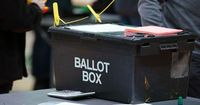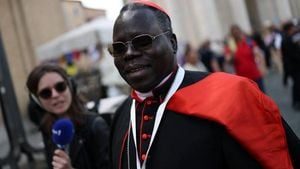The Conservative Party has lost control of Buckinghamshire Council in a significant shift during the recent local elections held on May 1, 2025. The results, which were officially declared on May 2, showed the Conservatives securing 48 seats, just one seat short of the 49 needed for a majority in the 97-member unitary authority. This marks a notable change for a council that has been historically dominated by the Tories.
In the election, the Liberal Democrats made substantial gains, winning 27 seats, while Independent candidates, including the Wycombe Independents, secured 13 seats. Reform UK, a party that has recently gained traction, won three seats, and Labour managed to secure four seats. The Green Party also made its presence felt, winning two seats.
Martin Tett, the leader of the Conservative group on the council, expressed disappointment over the results, stating, "It has been a very disappointing day for the Conservatives across the country. We have lost a lot of councils and a lot of good council leaders too, wiped out in a number of seats." Despite this, he pointed out that in Buckinghamshire, the Conservatives still hold a significant number of seats. "Here in Buckinghamshire, dare I say it, we have bucked the trend. We have actually got half of our seats now held by Conservatives, and if it hadn’t of been for Reform, I think we would have a pretty substantial majority," he added.
Tett attributed the loss of key seats to Reform UK, stating that the party had "cannibalised" their vote in crucial areas. He noted that while Reform UK only won three seats, their influence likely prevented the Conservatives from achieving a majority. "Reform has cannibalised our vote seat after seat after seat, which is why we now have the knife-edge situation we have in terms of the Conservatives having pretty much half the seats," he explained.
As the council faces a new political landscape, Tett indicated that discussions would take place over the coming days to determine the next steps for the council. However, he was clear about his stance on forming alliances, stating, "I don’t think it is a good idea to go into an alliance with Reform. The people of Buckinghamshire are going to have a very unstable council leadership for potentially four years now, and that is not good for services." He further characterized Reform UK as a "flash in the pan" party, suggesting that their influence may be temporary. "I’ve been around long enough to see the Brexit Party come and go, UKIP come and go. They are storming everywhere. They are full of some real fruitcakes," he remarked.
The recent elections represent a broader trend across the country, where the Conservatives have faced significant challenges. The loss of control in Buckinghamshire mirrors similar outcomes in Hertfordshire County Council, where the Conservatives also lost their long-held majority. The results have prompted a reevaluation within the party, as they look to address the growing support for Reform UK and other parties.
In Hertfordshire, the election results revealed that the Liberal Democrats emerged as the largest party, gaining seats and leaving no single party with overall control. This shift reflects a wider discontent among voters, who are increasingly looking for alternatives to the traditional Conservative and Labour parties. The Liberal Democrats' leader in Hertfordshire, Steve Jarvis, noted, "The Conservatives have clearly lost the overall majority they have had on Hertfordshire County Council for the last 26 years. We will be the largest party in the new council and we need to make a start on setting out what we are going to do differently for Hertfordshire."
As the dust settles from the local elections, the implications for both Buckinghamshire and Hertfordshire councils are significant. With no party holding a clear majority, coalition discussions are expected to dominate the political landscape in the coming weeks. The Conservative Party, once a dominant force in these regions, now faces the challenge of regrouping and addressing the concerns of voters who have turned to other parties.
The voter turnout for the Buckinghamshire elections was reported at 35%, slightly lower than previous elections, indicating a potential disengagement among constituents. This trend raises questions about the future of local governance and the effectiveness of the current political parties in addressing the needs and concerns of their constituents.
Looking ahead, the Conservative Party will need to reflect on its strategy and engagement with voters. As Tett mentioned, the party will spend time assessing its options and determining how to rebuild its standing in the community. The results from these elections serve as a stark reminder of the shifting political landscape in the UK, where traditional party loyalties are being challenged and new voices are emerging.
As Buckinghamshire Council navigates this new era of governance, the focus will be on ensuring stability and effective leadership for the residents. The upcoming coalition talks will be crucial in shaping the council's direction and addressing the pressing issues facing the community.






